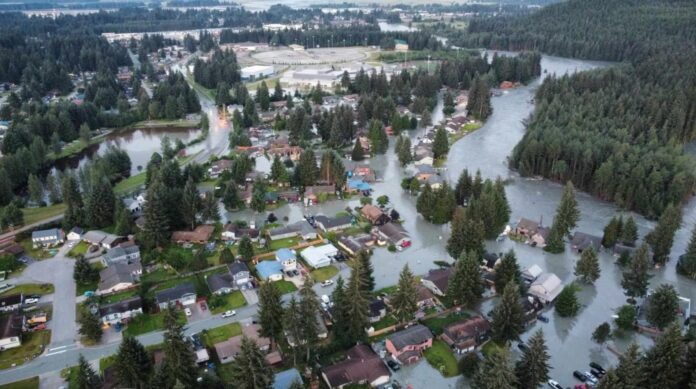By WIN GRUENING
“The greatness of a community is most accurately measured by the compassionate actions of its members.” ~ Coretta Scott King
The glacier outburst flood events of the last two years that placed Alaska’s Capital City in the national news have challenged the community of Juneau in ways that could never have been imagined. Financially and emotionally, affected residents are facing an impossible situation.
City officials are considering lining the Mendenhall River with Hesco barriers which may eventually cost tens of millions of dollars. But this is, at best, a stop-gap measure.
Without a long-term resolution within a reasonable time, hundreds of homeowners will find it difficult to sell their homes or obtain loans to improve them. The total assessed value of homes that could be impacted approaches $1.5 billion.
Juneau’s future as a healthy thriving community is threatened.
It is disheartening to hear some people suggest that Mendenhall Valley residents facing floods again next year are on their own: “They chose to live there, it’s their problem” or “They should have known better.”
Such attitudes ignore the reality that most Mendenhall Valley homeowners live in areas that are not within the 100-year flood plain and were not identified as hazardous flood zones when their homes were built or purchased.
What it reveals is a disturbing lack of empathy for our neighbors that casts a dark shadow over the city and our state.
Living in a community means belonging to a group of people who share common interests, values, or geographic location.
Communities can be large or small and may overlap. For instance, we may identify as American and as Filipino or as Alaskans and Juneauites. Communities can be distinctly different, but they are similar in that they give us a sense of connection, a feeling of belonging, and a network of support.
Even when groups have diverse political views or cultural backgrounds, to ensure a healthy community, members assume responsibilities to contribute positively. This includes respecting others, participating in civic discussions, and offering help when needed. By actively engaging and contributing, the result is a more inclusive and supportive environment for everyone.
So, when the Mendenhall Valley floods, or a tsunami takes out homes in local neighborhoods like Fritz Cove or Lena Point, or an avalanche or landslide buries downtown Juneau, residents recognize that they are all in it together.
Just like we witnessed when floods devastated Fairbanks and earthquakes struck Anchorage and Eagle River.
Not everyone will agree on how a community should function. Ideally, each of us will contribute in our own way, in accordance with our personal belief systems and physical and financial limitations.
But conceptually, supporting our neighbors in need is something that we should all agree upon. That means spreading major flood mitigation expenses over the entire community instead of saddling Valley homeowners with costs many cannot afford.
Furthermore, we should pull out all the stops in providing help as soon as possible. This means cutting governmental red tape where possible and not dismissing unconventional approaches that will meet predictable bureaucratic resistance.
One such approach, building a levee around Mendenhall Lake with local expertise and contractors is generally being ignored. Yet, it likely could be accomplished in a much shorter timeframe than the 5-10-year (or longer) option chosen by city officials.
What better way to show compassion for our neighbors than by allowing local residents to participate in and contribute to the solution?
City leaders are now beginning the long and torturous budgeting process for the next fiscal year to determine what Juneau can afford going forward.
Given the financial pressures being exerted by flood relief and mitigation, declining population, and falling school enrollments, city assemblymembers will need to be judicious in allocating budget dollars. This means that some discretionary spending may require trimming, and new revenue sources supported.
New revenues don’t necessarily mean higher property or sales taxes. Raising taxes should be a last resort. The Assembly is currently considering moving ahead on the Aak’w Landing project which could bring a much needed $150 million private investment to Juneau, providing additional tax revenue and employment opportunities.
Encouraging healthy economic growth is also a responsibility of Juneau residents that will allow the community to prosper and continue to help neighbors in need.
After retiring as the senior vice president in charge of business banking for Key Bank in Alaska, Win Gruening became a regular opinion page columnist for the Juneau Empire. He was born and raised in Juneau and graduated from the U.S. Air Force Academy in 1970. He is involved in various local and statewide organizations.
